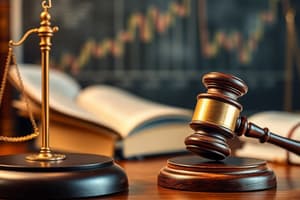Podcast
Questions and Answers
What is the primary focus of Economic Law?
What is the primary focus of Economic Law?
- Property rights and taxation (correct)
- Civil litigation processes
- Criminal law procedures
- Regulation of the stock market
Which concept in Economic Law involves comparing different institutions and systems for efficiency and effectiveness?
Which concept in Economic Law involves comparing different institutions and systems for efficiency and effectiveness?
- Coase Theorem
- Comparative institutional analysis (correct)
- Antitrust legislation
- Transaction costs
According to the Coase Theorem, when will firms maximize profits?
According to the Coase Theorem, when will firms maximize profits?
- When marginal cost equals price (correct)
- When price exceeds marginal cost
- When average cost is minimized
- When marginal cost is zero
What do transaction costs in Economic Law refer to?
What do transaction costs in Economic Law refer to?
Which of the following is NOT a concern of Economic Law?
Which of the following is NOT a concern of Economic Law?
How does Economic Law help economists and lawyers understand market behaviors?
How does Economic Law help economists and lawyers understand market behaviors?
Flashcards are hidden until you start studying
Study Notes
Economic Law is a field of study that combines both legal theory with economic principles, exploring how laws can impact economies and vice versa. It's often regarded as part of public policy and focuses on issues like regulation, property rights, taxation, competition, and trade. This interdisciplinary subject is commonly taught in business schools, where students learn how they could apply their knowledge across industries. For instance, one concept within this discipline is comparative institutional analysis—this refers to comparing different institutions and systems when it comes to efficiency and effectiveness.
The field is also concerned with understanding how illegal activities affect market prices, the formation of cartels, and antitrust legislation among other things. On top of this fundamental premise, there exist theories such as Coase Theorem which states that firms will maximize profits by expending resources until marginal cost equals price. Another major idea involves transaction costs, the expenses involved in conducting a business transaction where externalities play a role too. All these concepts help economists and lawyers understand why people behave the way they do under certain conditions.
In essence, economic law allows us to analyze what happens if we change some aspect of our marketplace - anything from changing taxes to regulating particular goods or services, or even restricting trade between countries. By combining elements of law and economics, scholars have been able to develop powerful tools designed specifically for analyzing real world problems related to resource allocation, security etc., thereby giving it great practical significance beyond mere intellectual curiosity.
Studying That Suits You
Use AI to generate personalized quizzes and flashcards to suit your learning preferences.





